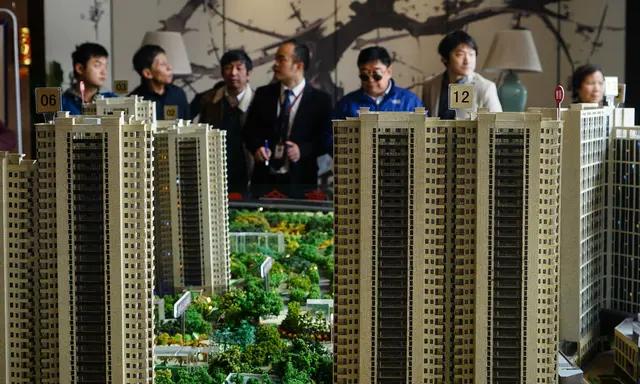(SOUTH CHINA MORNING POST)Guangzhou is likely to become the first tier-one city in mainland China to lift home-purchase restrictions for buyers from Hong Kong and Macau, hinting at the mounting sense of desperation felt by the authorities in the world’s second-largest economy as they seek to speed up property destocking and boost economic growth.
A document containing 11 instructions released by the Guangdong provincial government on Monday night said Hong Kong and Macau buyers could enjoy the same benefits as locals in “eligible cities” in the province as part of its plan to clear the stock of 160 million square metres of unsold flats.
It did not identify the eligible cities, but industry experts said they believed Guangzhou would stand a high chance as the city’s home prices had been lagging those of other cities.
Guangzhou and Shenzhen are among 21 cities in Guangdong province.
“I think it is possible that Guangzhou would lift home-purchase restrictions, especially in new districts where inventory is high,” said Alan Jin, a property analyst at Mizuho Securities.
The current home-purchase restrictions covered the whole Guangzhou except for two fringe districts, Zengcheng and Conghua, he said.
One of the 11 instructions said Guangzhou should adjust the effective administrative boundaries for obsolete home-purchase restrictions.
Jin said that after the adjustment, home-purchase restrictions might be lifted in some of the outlying districts of Guangzhou, but not in centres such as Haizhu and the Pearl River New Town area.
Ellis Wong, general manager at Centaline China’s Guangzhou branch, said Hong Kong buyers accounted for less than a tenth of transactions at present.
“It may not lure large buying groups from Hong Kong, where home prices are falling and investment yield will be more attractive than Guangzhou,” he said. “More importantly, the continuing yuan depreciation will increase currency exchange risk.”
Midland Realty said it expected home sales in Hong Kong’s primary and secondary market had plunged to 1,976 deals in February, the lowest monthly total since 1996.
Zhang Zhaoxing, chairman of Guangzhou-based Yuexiu Property, said the Guangdong government was likely to lift buying restrictions on a district-by-district basis with reference to demand-supply balance, instead of lifting them for the whole city.
The instructions came three days after China’s central bank chief, Zhou Xiaochuan, unveiled more supportive measures for the property sector, including further encouragement for individual housing loans and giving banks more flexibility on interest rates and down-payment ratios.
Jin ruled out the possibility of extending the relaxation to other tier-one cities.
“Guangzhou is the only possible one among tier-one cities to see lifting of buying restrictions,” he said. “Shenzhen and Shanghai are not likely given the frantic run of housing prices. Beijing has huge population inflow pressure already.”
New home prices in Shenzhen, Beijing and Shanghai surged in the past 12 months, but Guangzhou saw a year-on-year decline of 1.38 per cent in February , according to property research house China Real Estate Index System (CREIS). That compares with 53 per cent growth in Shenzhen – the biggest price rise in China – 15 per cent in Shanghai and 9 per cent in Beijing.
Guangzhou joined other cities and implemented strict restrictions on purchases of second homes in 2013 as part of efforts to rein in runaway housing inflation. Since mid-2014, such heavy-handed restrictions have gradually been phased out in all but the four first-tier cities and Sanya on the tropical island of Hainan.
To quicken the pace of destocking, Guangdong’s new policy aims to reduce the amount of unsold units by 12.5 per cent from now to 2018.
As at the end of 2015, the province had unsold stock of 160 million square metres.
Guangzhou, given the mission of clearing 1.8 million square metres by 2018, has unsold stock of 22.48 million square metres, the highest in the province.
Other local governments are also stepping up efforts to stimulate home buying. Shenyang, a major city in north China, announced on Monday a “zero down payment” requirement for university graduates within five years of finishing their studies.
 简体中文
简体中文

